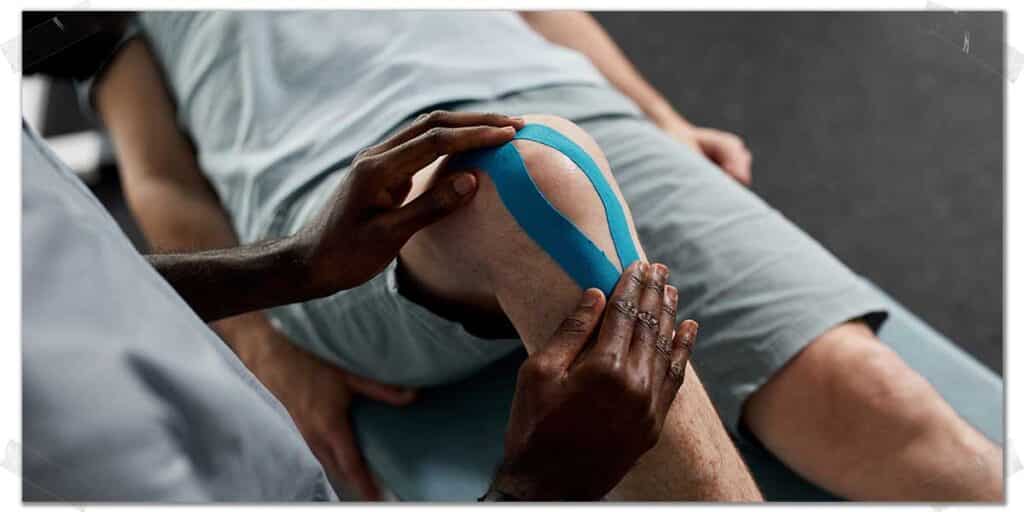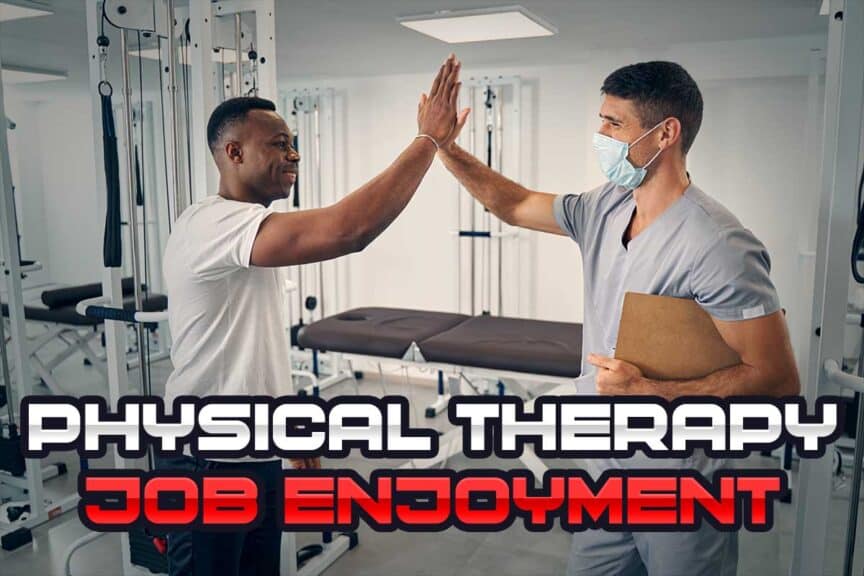No one wants to work a job that drains the life out of them. No one should, either, at least not as a career. Sometimes jobs are merely a means to an end. But when it comes to one’s career, I’m often asked if a career in physical therapy is worth it, if it’s fulfilling, and if it’s fun.
I’ve got LOTS to talk about.
Being a physical therapist is incredibly fun if you keep an element of autonomy in your clinical practice; if you’re forced to see as many patients as possible in your schedule every day and exhaust yourself doing so, you’ll burn out. Autonomy is the key to having fun as a physical therapist.
So, what does that all mean, and how did I arrive at that conclusion? Keep on reading if you want to learn some surprising details.

A small request: If you find this article to be helpful, or you appreciate any of the content on my site, please consider sharing it on social media and with your friends to help spread the word—it’s truly appreciated!
Related article:
What makes physical therapy so enjoyable for physical therapists?
Of course, this section, by its nature, is quite subjective; physical therapists can enjoy their careers for all sorts of reasons. However, in my years of being one, I’ve hung out with enough students and licensed therapists to pick up on some common themes, which I certainly identify with.
If you ask any student who wants to become a physical therapist (PT) or someone who already is a PT what they find most fulfilling about the job, it’s usually a response along the lines of “the fact that I get to help people.”
Dissecting that answer a bit more, it tends to be that we as therapists get to see many beautiful events transpire during a patient’s rehabilitation (when we help them), which include:
- Helping patients understand how truly resilient the human body (and spirit) is.
- Helping patients overcome their current limitations and learn what they’re truly capable of achieving.
- Fostering a therapeutic relationship and alliance with our patients in a way that builds trust, confidence, and a sense of safety.
- Getting to know the patient as an individual – as a human being who is just like you or me.
Let me tell you: each and every one of those points fills me with a sense of purpose I can’t quite attain any other way. And, perhaps, it’s that last point in the list that brings everything else about the joys of being a physical therapist to life; it’s all about fostering relationships with our fellow brothers and sisters.
Related content:
Naturally, when a therapist can objectively see, or at least feels they’re making a positive difference in the lives of their patients, physical therapy is immensely satisfying, rewarding, and fun.
So, it’s all about serving the patient and making a difference in their lives, be it physically, emotionally, socially, spiritually, or any combination of such factors. But it’s not just that we get to do it; it’s also how we get to do it.
And for the “how,” much of it comes through obtaining a sense of personal and professional autonomy.
Why autonomy is so important to the physical therapist

To find motivation and fulfillment within their pursuits, human beings require three innate psychological needs to be met. Without fulfilling these needs, their motivation, fulfillment, meaning, enjoyment, and plenty of other positive psychological factors dwindle.
Known as the self-determination of behaviour model, which is a widely accepted model within the world of psychology, this model asserts that human beings require three unique factors or needs for their emotional well-being (which determines their overall motivation).1–3
To attain motivation and well-being, human beings require:
- A sense of competency
- A sense of relatedness
- A sense of autonomy
Each of these needs can be met through various avenues in our lives—meeting them through professional work is only one such way. Yet, work is significant since we spend a significant portion of our lives in a work-related environment (careers last decades, ya know).
And when it comes to the profession of physical therapy, physical therapists can be in a unique position by often obtaining the first two factors but struggling for the third (in my opinion, anyway).
Regarding workplace motivation: in the profession of physical therapy, therapists can be in a unique position of obtaining competency, relatedness, but perhaps lacking a sense of autonomy, which is central to human motivation.Click to PostYou see, physical therapists use a lot of critical thinking skills when in the clinic; there are a lot of puzzle pieces that must always be analyzed and put together when evaluating and treating a patient. We go through a lot of schooling to be able to do this effectively, and it feels amazing to have a skill set we can offer to those around us.
This provides us with a sense of competency in our lives; we feel that we are knowledgeable and skilled at something, making us feel useful and valuable to those around us, which is crucial for enjoyment.
In other words: competency? Check mark!
Relatedness (the second need within the self-determinism model) refers to the sense of connectedness between human beings through social connection and interaction, among other forms of connection.
For a majority of physical therapists, this isn’t much of an issue; most of us work with a team of colleagues with similar interests (professional and often personal). We also experience a unique sense of connectedness through shared experiences of our academic and professional journies.
We also work with patients whom we build therapeutic relationships with.
So, relatedness? Check mark!
…and then there’s autonomy.
This is where I personally believe things can fall apart for therapists, particularly new graduates who, like myself, have back-breaking amounts of student loan debt or those who—on a daily basis—feel forced to treat more patients in a day than they can adequately manage—something that appears to be more common than I’d like to admit.
Related content:
These sorts of situations can lead to physical therapists feeling as if their hands are tied, forcing them to serve their patients in ways the therapist may feel is less than ideal. It’s a frustrating feeling; we want to be able to provide the best care possible for our patients and to look out for our own well-being in the process.
So when unfortunate situations such as these arise, physical therapy can, unfortunately, lose its fun at an alarming rate.
When physical therapy is no longer fun

When being a physical therapist is no longer fun, it’s typically not due to losing our passion for helping others, the patients themselves, or even our co-workers.
Those can, of course, become factors, but I’d say it’s not very common for any of those issues to be the sole contributing factor to the loss of enjoyment.
Most online forums I’ve read, discussions I’ve been a part of, and individuals whom I’ve talked to have instead mentioned a particularly common theme when it comes to burning out or losing their passion for physical therapy:
Losing the sense of autonomy—that is—losing the sense of personal freedom in making work-based decisions (such as patient treatment) can bleed a PT’s passion dry, especially when the therapist feels it comes at the expense of their patients.
To be clear: there are a multitude of reasons why the profession of physical therapy can lack fulfillment or enjoyment (the same as any other profession). Still, feeling like the therapist has little, no, or not enough personal say in their day-to-day caseload management and treatment of their patients is an all too common issue for physical therapists.
I have known this feeling all too well when starting my professional career, and I can’t adequately put into words just how terrible it can feel to believe that your patients aren’t getting the best experience possible. Thankfully, this is no longer an issue for me, but to be clear, I have felt it for myself.
Examples of losing autonomy can be quite varied but tend to have themes such as:
- Being forced to see as many patients a day as possible with extremely short treatment times (and not having any say in the matter). This is a recipe for burnout for many physical therapists, especially new graduates.
- Not having access to equipment that the therapist knows would benefit the patient.
- Not having the specialized training or skills to further treat or help the patient.
- Being forced or confined into treating patients using treatment methods or techniques the therapist may not believe to be maximally helpful.
In my young career, I’ve already seen these types of scenarios play out through plenty of other therapists, most notably through many of my friends who work at clinics that are different than the type that I work at (I’m very spoiled with the company and team for whom I work, but I have struggled in the past).
In other words, if the values of the therapist are not in alignment with the clinic’s values and the therapist feels they must go along with what the clinic dictates, a sense of loss of the therapist’s autonomy will likely arise.
Not having any autonomy means not having any fun.
Related content:
How to keep having a great time as a physical therapist
There’s no single, universal answer to this topic, just as there’s no single, universal treatment technique for a patient; context and individual needs determine the answer.
Nonetheless, some of the strategies that I often find helpful for therapists keeping their jobs enjoyable and meaningful (I know many fellow therapists who have done any of the following) are:
- Finding something—anything—when spending time at the clinic (ideally when treating patients) that provides a sense of autonomy for the therapist and serves the patient in the process.
- Finding a physical therapy-related pursuit outside of work that the therapist finds meaningful, such as tutoring PT students, starting a YouTube channel (link takes you to my channel), Facebook group, blog, etc.
- Reading up on, or learning and acquiring knowledge and skills associated with clinical practice (that can one day hopefully be used in the clinic).
Such strategies are examples of how physical therapists I know have been able to reclaim a sense of autonomy within their professional lives by pursuing an aspect of physical therapy on their own terms.
Fun fact: Though I enjoy a healthy sense of autonomy in my clinical pursuits, I started this website to enhance that feeling of autonomy even more, and it has been an amazing feeling to serve and help my online audience while gaining an added sense of freedom in how I deliver my passion in helping others!
All of these strategies above, of course, assume the issue with one’s lack of enjoyment is autonomy-related in nature. If the issue stems from clashing with staff members, patients, etc., then different strategies altogether will likely need to be considered.
It may be that switching to a new, more ideal clinic (ideally one that affords a greater sense of autonomy) may be the only option, but hopefully, things don’t come to this.
Final thoughts
Being a physical therapist is immensely rewarding and fun, but a few critical stars must align to keep it sustainable. If you want to have fun as a physical therapist, you need to help your patients in ways that are meaningful to them and enjoyable for you to deliver. If you feel you have the freedom to treat others using your own methods and style, you’ll have lots of fun.
Frequently Asked Questions
To be as helpful as possible, I’ve included a few additional frequently asked questions, along with answers for those curious about job satisfaction and enjoyment as a physical therapist.
References:

Hi! I’m Jim Wittstrom, PT, DPT, CSCS, Pn1.
I am a physical therapist who is passionate about all things pertaining to strength & conditioning, human movement, injury prevention and rehabilitation. I created StrengthResurgence.com in order to help others become stronger and healthier. I also love helping aspiring students and therapists fulfill their dreams of becoming successful in school and within their clinical PT practice. Thanks for checking out my site!

